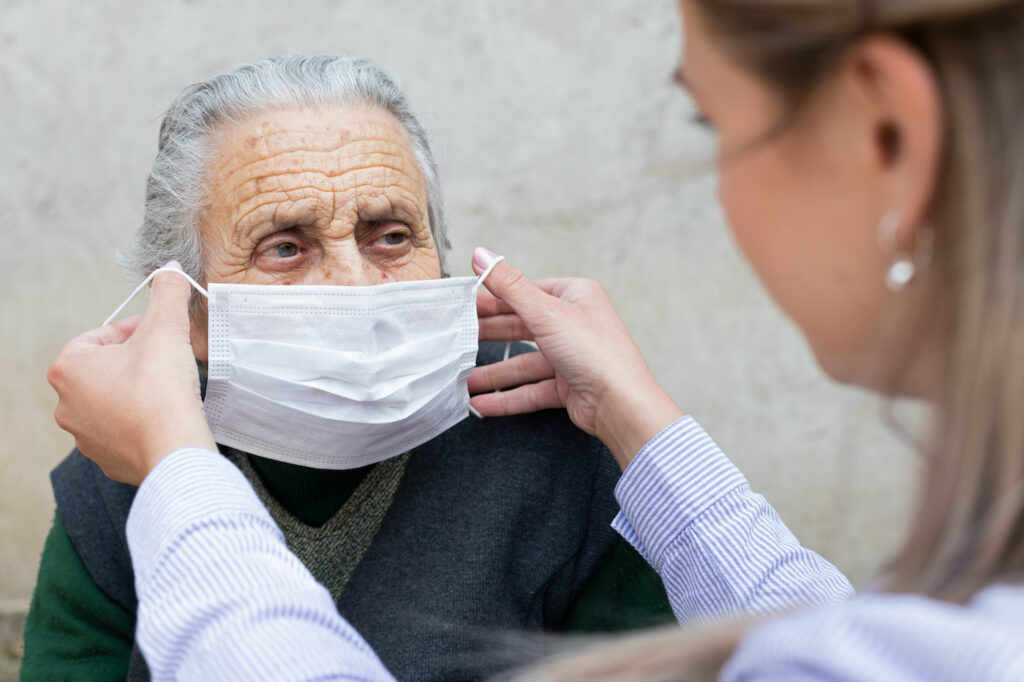
Carers are the pillar of our social care system, with Carers UK (2019) reporting that 1 in 8 adults (almost 6.5 million people) fulfilling that role. Since the coronavirus outbreak, there has been a rapid increase in the amount of care provided by unpaid carers, which has impacted upon their finances, relationships, quality of life, physical and mental health (Carers UK, 2020).
The Alzheimer’s Society (2014) estimate that there are over 670,000 people in the UK acting as the primary, unpaid carer for a person with dementia. For many unpaid carers, paid care is essential as it relieves some caring duties, therefore reducing stress and enhancing wellbeing. Paid care is also important for the person with dementia, as it promotes their independence, by enabling them to live in their own home for as long as possible. It includes support with a range of activities such as washing, dressing, laundry, medication adherence, meal preparation and food shopping. Care visits are typically short and it is rarely the same paid carer who visits each time, but various carers visit each day (Hughes & Buch, 2020).
Social distancing measures and increased concerns about safety during the COVID-19 pandemic are likely to have impacted decisions to receive paid care. Unpaid carers will have had to negotiate the risks of strangers coming into the home to provide care versus the burden of providing additional care themselves.
Giebel and colleagues (2020) investigated this issue in their research, in which they aimed to “explore the decision-making processes of unpaid carers in receiving paid home care for someone living with dementia in the time of COVID-19”.

Social distancing measures and increased concerns about safety during the COVID-19 pandemic are likely to have impacted decisions to receive paid care for people with dementia. Giebel and colleagues aim to investigate in this study these issues during the first UK lockdown.
Methods
The researchers interviewed 15 unpaid carers with experiences of accessing paid home care during COVID-19 times. Participants were recruited nationally via social care and social support services, including global and national carer and dementia organisations. All participants were female except for one individual. Most participants were caring for their spouse and most lived with the person with dementia.
Interviews took place between April and early May 2020, during the early stages of the first UK lockdown. In the interviews, carers were asked about their experiences of accessing social support services, including paid home-care services, before and after the COVID-19 outbreak. The research team analysed the interview data using thematic analysis.
Results
The researchers indicated that unpaid carers had to make difficult choices on whether to continue paid home care during the COVID-19 pandemic, while these decisions had a powerful impact on their lives.
Many unpaid carers decided to suspend paid care visits due to fears of transmitting coronavirus to the care recipient. These fears were heightened by the number of unfamiliar, paid carers entering the home and a lack of available Personal Protective Equipment (PPE). Unpaid carers were therefore faced with the difficult decision of cancelling their paid care support to protect the safety of the person living with dementia. Consequently, unpaid carers found themselves taking on additional caring responsibilities. This increased stress levels and some felt ‘unqualified’ to provide additional support.
The decision to cancel paid care had drastic implications for unpaid carers. They reported practical challenges, such as not being able to shop online due to not being classed as ‘vulnerable’. There were also personal implications, with participants reporting that they made changes to their own lives, such as moving in with the person with dementia and working from home while caring full-time. This led to an increased workload and strain upon them. Additionally, unpaid carers reported limited access to family and peer support because of social distancing measures. This added to feelings of stress and fatigue in caring solely for the person with dementia at a higher level than before COVID-19.
While some unpaid carers suspended paid home care, others accepted the risks and said cancelling paid care was not an option because they would not have been able to cope. These people also expressed fears about being able to reobtain care after the pandemic. For example, they were concerned that if they managed without paid care during the pandemic, then they would be unlikely to get it back. However, the researchers reported that even when unpaid carers maintained some paid support, it was often at a reduced level to comply with public health restrictions or where staff shortages limited the amount of time available.

Unpaid carers discontinued paid care due to risk of infection, resulting in them providing additional support, which increased their stress levels, carer burden and practical challenges.
Conclusions
Giebel and colleagues (2020) conclude:
Unpaid carers had to make difficult choices on whether to continue paid home care, and where it was discontinued, experienced a strong impact on their lives as carers.
Many participants discontinued paid care to reduce the risk of infection, resulting in them providing additional support for the person with dementia. In turn, this increased stress levels and carer burden.

This study amplifies the voices of unpaid carers; voices that were often ignored or dismissed during the coronavirus pandemic by highlighting the difficult choices they had to make and the impact.
Strengths and limitations
This is the first study to explore the decision-making processes and experiences of receiving paid home care for dementia during the COVID-19 pandemic. The voices of unpaid carers are amplified in this research; voices that have too often been ignored or dismissed during the pandemic.
However, there are some limitations. For example, there is a lack of diversity in the sample, which includes only one carer from a Black or minority ethnic group. Yet, carers from Black or minority ethnic groups provide more care than average and face additional challenges (Carers UK, 2011). Research with ethnic minority carers is particularly important given the increased risk factor for COVID-19 mortality in this group (Rose, Mason, & Pennington, 2020).
Giebel and colleagues’ (2020) work provides an important foundation for research on this topic. However, it provides only a brief snapshot of a specific time during the pandemic. Given the uncertainty and longevity of the pandemic, longitudinal research is required to further explore unpaid carers experiences. This is something that has been addressed in more recent work (e.g., Giebel et al., 2021).

Although the findings shed a light in paid care for people with dementia during the pandemic, more research is needed with diverse samples and increased representation from ethnic minorities.
Implications for practice
The increased burden on unpaid carers when decisions are made to suspend paid care suggests care staff need to be better supported in providing home-based care, have adequate PPE, and potentially reduce the number of care staff entering a home. This will allow families to feel more comfortable in receiving much needed support from paid care staff. This is particularly important given that unpaid carers may face increased demands due to dementia symptoms worsening during the COVID-19 pandemic (Giebel et al., 2020; The Alzheimer’s Society, 2020; Talbot & Briggs, 2021). The research also highlights the importance of unpaid carers having access to appropriate support that combats the emotional and mental health consequences of caring during COVID-19 times.
If you are a carer in need of help and advice, Carers UK offer information and support. Their telephone helpline is available on 0808 808 7777 from Monday-Friday 9am-6pm or you can contact them by email on advice@carersuk.org. You can visit their website at www.carersuk.org
Samaritans are open 24 hours a day, 365 days a year. You can call free anytime, from any phone on 116 123.

The increased burden on unpaid carers when decisions are made to suspend paid care suggests staff need to be better supported in providing home-based care, have adequate PPE, and potentially reduce the number of care staff entering a home.
Statement of interests
Dr Catherine Talbot is currently collaborating with Dr Giebel on a research project, but had no involvement in this study. Catherine has worked on a similar piece of research that examines the experiences of carers and people with dementia during the COVID-19 pandemic.
Links
Primary paper
Giebel C, Hanna K, Cannon J. et al (2020) Decision-making for receiving paid home care for dementia in the time of COVID-19: a qualitative study. BMC Geriatrics 2020 20(1) 1-8.
Other references
Carers UK (2011) Half a million voices: Improving support for BAME carers.
Carers UK (2019) Facts about carers.
Carers UK (2020) Caring behind closed doors: six months on. The continued impact of the coronavirus (COVID-19) pandemic on unpaid carers.
Giebel C, Cannon J, Hanna K. et al. (2020) The impact of COVID-19 related social support service closures on people with dementia and unpaid carers: a qualitative study. Aging & Mental Health 2020 1-8.
Giebel C, Pulford D, Cooper C. et al. (2021) COVID-19- related social support service closures and mental well-being in older adults and those affected by dementia: a UK longitudinal survey. BMJ Open 2021 11(1) e045889.
Hughes S, & Burch S. (2020) ‘I’m not just a number on a sheet, I’m a person’: Domiciliary care, self and getting older. Health & Social Care in the Community 2020 28(3) 903-912.
Rose T, Mason K, & Pennington A. (2020) Inequalities in COVID19 mortality related to ethnicity and socioeconomic deprivation. MedRxiv doi: 10.1101/2020.04.25.20079491v2 .
Talbot CV, & Briggs P. (2021) ‘Getting back to normality seems as big of a step as going into lockdown’: The impact of the COVID-19 pandemic on people with early to middle stage dementia. Age and Ageing 2021 1-7.
The Alzheimer’s Society (2014) Dementia today and tomorrow: A new deal for people with dementia and their carers.
The Alzheimer’s Society (2020) Worst hit: Dementia during coronavirus.
Photo credits
- Photo by Cristian Newman on Unsplash
- Photo by Dominik Lange on Unsplash
- Photo by Nathan Dumlao on Unsplash
- Photo by Artyom Kabajev on Unsplash
- Photo by engin akyurt on Unsplash
- Photo by Nick Fewings on Unsplash
